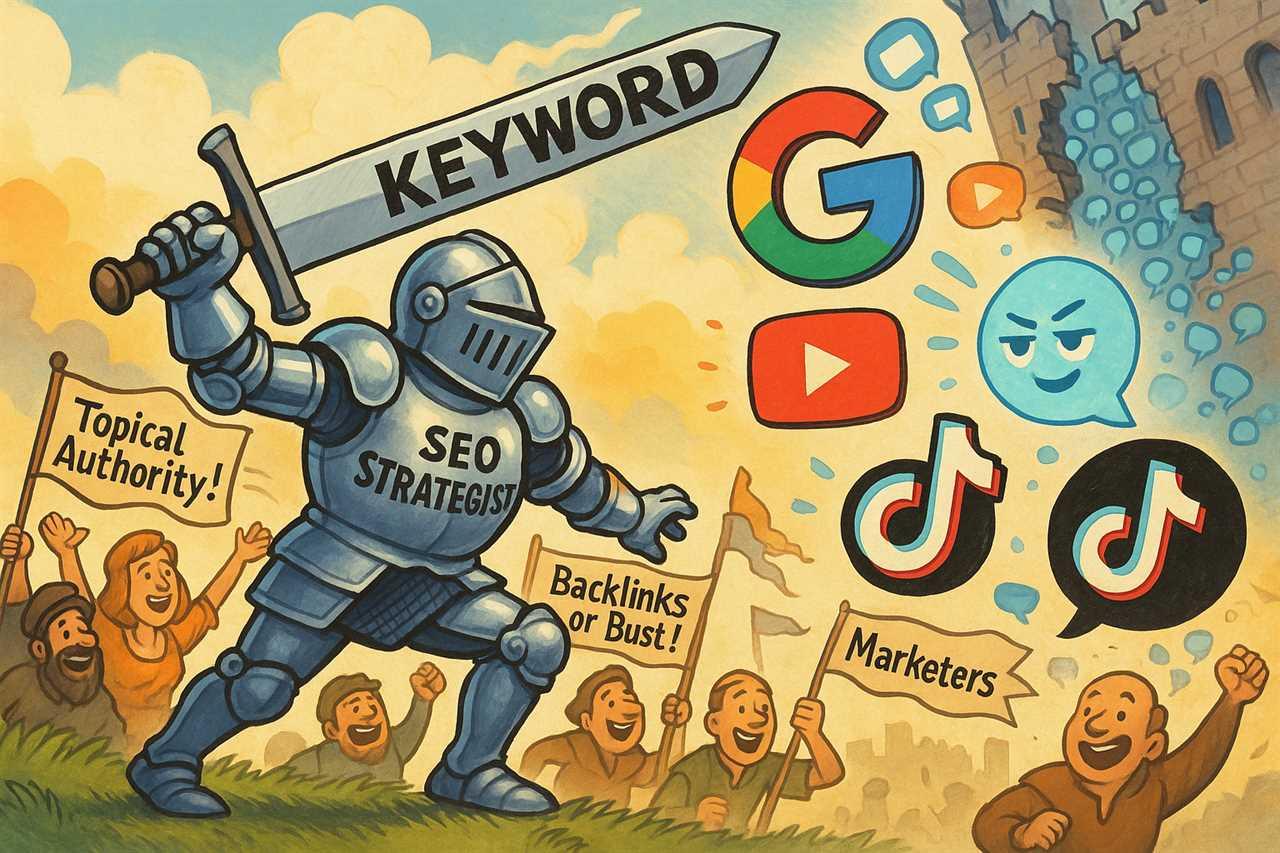
The SEO game isn’t what it used to be. Gone are the days when keyword density and simple backlinks could rocket a page to the top. Today, search is fragmented, AI-driven, and fiercely competitive. If businesses want to secure visibility on Google, ChatGPT, Perplexity, YouTube, and even TikTok, they need to rethink their strategies from the ground up.
Over the last decade, SEO pioneers like Nathan Gotch have tested and refined systems that consistently deliver predictable number-one rankings. His framework isn’t about chasing quick wins—it’s about building authority in an era where Google and AI platforms set the rules. Let’s dive into his proven four-step process for dominating modern search.
Step 1: Understanding the New Search Battleground
Google is still the most visited site in the world, but it’s no longer a single search engine experience. The modern user interacts with:
AI Overviews – quick summaries powered by Google’s AI.
AI Mode – a conversational layer that generates full responses.
Gemini – Google’s advanced AI model influencing multiple products.
Traditional Results & Local Pack – the “old” blue links and map listings.
Each of these requires slightly different SEO tactics. But here’s the bigger twist: Google is no longer the only player in search. People are asking questions on YouTube, ChatGPT, Perplexity, and even TikTok before they ever open a browser tab.
That means businesses must stop thinking of SEO as just “ranking in Google” and instead view it as visibility across all search touchpoints.
Step 2: Modernizing Keyword Strategy
Forget about chasing keyword density—Google and AI models now care about natural, contextual queries.
Here’s how to adapt:
Leverage Perplexity’s Query Fanout. Enter a commercial keyword like best baseball cleat for pitchers and watch how it generates related natural queries. This reveals how AI interprets intent.
Analyze Retrieval Augmented Generation (RAG). AI platforms pull data from search engines, Reddit, and YouTube when they lack trained answers. Ranking in these sources directly shapes AI responses.
Mine People Also Ask (PAA). Tools like the Detailed Chrome extension can extract PAA queries from Google, giving you a goldmine of conversational search prompts.
Use Google Search Console Filters. By applying formulas, you can find queries with commercial intent that are over 10 words—prime candidates for AI-driven search.
The key isn’t keyword stuffing, but covering the topic in depth. This is where keyword clustering comes in: grouping related queries into topical hubs that show search engines (and AI models) you’re the authority on the subject.
Step 3: Topic Domination
Pick one service or product—say furnace repair in St. Louis. Instead of scratching the surface, go a mile deep.
Start with your website:
Use tools like Rankability’s Content Optimizer to draft a strong commercial landing page.
Enrich it with real testimonials, unique offers, and clear value propositions.
Edit meticulously—AI can draft, but humans polish.
Expand with clusters:
Pull related search terms from Google Search Console.
Break them into commercial pages (furnace humidifier installation in St. Louis) and blended-intent blog posts (how much does a furnace humidifier cost in St. Louis).
Don’t move on until you’ve exhausted every angle of the topic.
Distribute across other platforms:
YouTube – Optimize scripts with keywords since transcripts feed AI retrieval.
LinkedIn – Use the same content to rank via LinkedIn’s domain authority.
Reddit, directories, and niche sites – Place content where AI pulls references.
By blanketing the web with topic-driven content, you establish topical authority, making your brand the “default” answer across AI and traditional search.
Step 4: Signaling
Creating content is only half the battle. You must also send the right signals to algorithms and AI platforms:
Website Authority (Backlinks Still Matter).
AI retrieval systems often cite sites with strong backlink profiles.
Use ChatGPT to find which sources it cites for your keywords, then target those sites for outreach.
Third-Party Reviews.
Local businesses should prioritize their Google Business Profile but diversify reviews across platforms like Yelp, Angie, and HomeGuide.
AI trusts diversity—it shows legitimacy.
Brand Mentions Everywhere.
Secure mentions in forums, magazines, and directories that AI references.
The more your brand appears across these trusted domains, the more likely it becomes the cited authority in AI-generated responses.
How is AI changing SEO in 2025?
Modern SEO isn’t about tricking an algorithm—it’s about shaping the conversations that AI and search engines have with users.
Honestly? AI has turned SEO on its head in 2025.
Think about it—back in the day, SEO was all about keywords and backlinks. You’d sprinkle “best pizza near me” twenty times on a page, cross your fingers, and boom—traffic. But now? That playbook is toast.
AI platforms like ChatGPT, Perplexity, and Google’s Gemini aren’t just scanning for keywords anymore. They’re having conversations with users. Instead of “cheap running shoes,” people are asking, “I overpronate, I’m training for my first marathon, and I need shoes under $300—what’s best?” And the AI actually understands the nuance.
Here’s where it gets wild: these AI tools don’t just rely on their training data. They go fetch answers from the web in real time. That means if your site isn’t ranking in Google, Reddit, YouTube, or other trusted sources, AI might skip over you completely.
So SEO in 2025 is less about stuffing keywords and more about:
Covering entire topics in depth so AI sees you as the authority.
Publishing across multiple platforms, not just your website.
Building signals like backlinks, reviews, and brand mentions that make AI say, “Yep, this brand’s legit.”
In short—AI has turned SEO into a game of shaping conversations instead of chasing clicks.
If you found this article helpful, please share it so others can benefit too. Be sure to keep an eye out for more upcoming posts packed with powerful SEO tips and strategies. In the meantime, feel free to explore our other articles to deepen your knowledge and stay ahead of the curve: How to Rank Local Businesses in 2 Weeks Without Hacking Google






